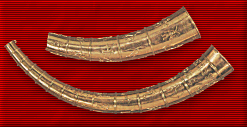| The 19th Century, 1800 -
1899 War with The United Kingdom |
|||
In the beginning of the century Denmark was still an important power in the northern part of Europe, but in the end of the century Denmark became one of the smallest countries in Europe.Like other countries in the world Denmark improved the communicationlines, eg. steamshiplines, telegraphlines, postal service. People are getting telephones, electricity - factories, gasworks, railroads, tramlines - everything for a modern society is being made ready.
1801 War with the United Kingdom
Since 1792 the United Kingdoms have been at war with France. Denmark is neutral, but have to convoy merchant ships. July the 25th 1800 The frigate "Freja" had to strike the colors after a fight with 4 English navyships, which wanted to search the Danish merchant ships, the frigate was escorting.
In August 1800, 19 ships from the English navy are anchoring outside Copenhagen and forces Denmark to give up convoying any merchant ships.
Naturaly the English disrespect of the Danish neutrality is a serious problem and the Danes renew the agreement, from 1780, about military co-operation with the baltic powers, which are Russia and Sweden.
In December 1800 the russians seizure the English ships, which are in russian habours, and suddenly the agreement is against England. January 1801 England is seizuring all Danish ships in English harbours, and besides the English also occupy the Danish colonies in India and the West Indies.
March the 30th 1801 53 English navyships is sayling down the Sound to Copenhagen. Because the wind is in wrong direction the Swedish can't help the Danes, and in the east the russian navy can't sail because of ice. Denmark is alone against the big power. Once again the citizen of Copenhagen are standing together in defending Denmark.
The Danish fleet is not ready for fighting, because it has been winter. The Danish ships are placed in a curve so they together with the fortresses can defend the capital of Denmark.
Early in the morning, April the 2nd 1802, the 2nd commander of the English navy, admiral Nelson gives the signal for attacking. The Danes are defending very bravely, and what should have been an easy battle for the Englishmen is going on.
The 1st commander of the English navy, admiral Parker orders the battle to be stopped. Admiral Nelson ignores the order, but as the English navy are in trouble he sends a negotiator to the Danish crownprince, who are the ruler of Denmark.
The negotiator tells the crownprince, that admiral Nelson will burn the captured Danish ships without giving the sailors any chance to resque themselves. It is a lie, but the crownprince belives what he is being told and orders the fighting stopped.
Because there still were English ships, which did not have been in use for the battle, the Danes probably would have lost at last.
The result of the negotiations was Denmark had to leave the military co-operation with Russia and Sweden.
A goldsmith from Copenhagen steals the Golden Horns, which were found 1639 and 1734.
The Golden Horns were national treasures.
The goldsmith remelted the Golden Horns, before he was captured. The Golden Horns has been remade after the drawings, which were fortunately made of them.

